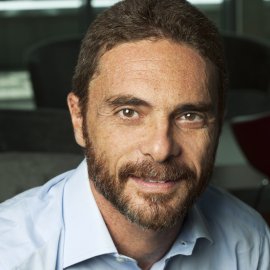Sociology of culture and communication, University of Catania, Italy

Octobre - Décembre 2014
Guido NICOLOSI is an Associate Professor of Sociology of culture and communication at the Department of Political and Social Sciences, University of Catania, Italy where he teaches sociology of culture and new media. Member of several research teams in national and international research programs, he has been working for the last ten years on the issue of Body, Technology and Society. He has been visiting scholar at the Universities of Exeter (UK), Aberdeen (UK) and Paris I Panthéon-Sorbonne and he cooperates with the Critical Technology Construction group at the Departement of Sociology and Anthropology of Development at the Wageningen University (NL), where he got his PhD. He is member of the Research Committee on ’The Body in the Social Sciences’ of the International Sociological Association; member of the scientific board of the Groupe de Travail 41 of the French Sociological Association on Body, Technique and Society; member of the Scientific Board of the School of Robotics in Genoa; Associate Member at the Centre d’Étude des Techniques, des Connaissances et des Pratiques (CETCOPRA) of the University Paris I Panthéon-Sorbonne.
Open source biotechnology: a social method for re-skilling practices and re-embedding technology?
The project on which Guido NICOLOSI works during his fellowship at IAS-Nantes focuses on a particular method of social re-embedding of biotechnology that is oriented to re-skilling the practices of production: the open source biotechnology. This concerns the application of a successful model of social distribution and participation of digital production in informatics to biotechnology research and production. Open source is considered here as a blueprint, a metaphor, a social practice and a political movement at the same time.
In the first stage, this research seeks to investigate the phenomenon theoretically, analyzing both risks and opportunities. Ethical, social, environmental and political issues will be widely discussed. In the second stage, the project aims to empirically analyze concrete practices produced within existing open source experience as a model of bottom-up biotechnology. The research is especially interested in investigating ethnographically discourses and practices produced within bio-hacker laboratories and research projects developed in developing countries.
